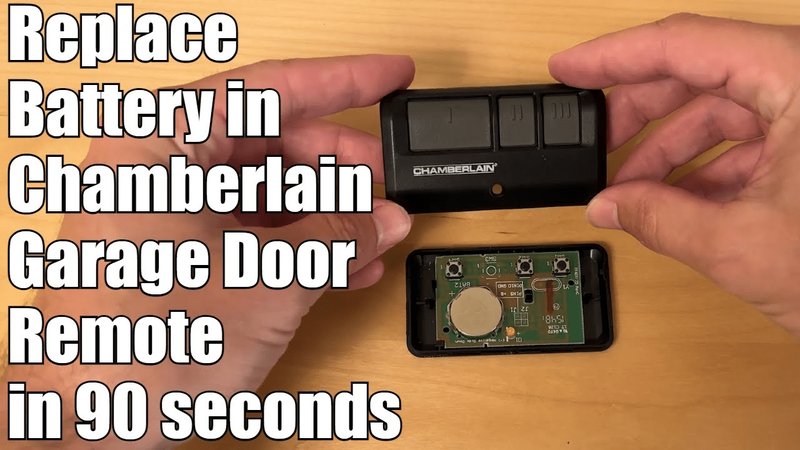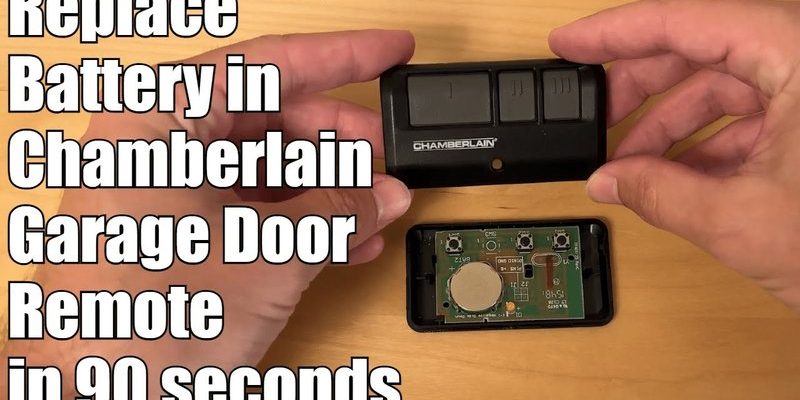
Imagine your remote’s battery as the fuel in a car; without it, you won’t get very far. Just like you wouldn’t want to run out of gas unexpectedly, you don’t want your garage door remote to let you down at the last minute. In this article, we’ll break down the batteries used in different brands, their expected lifespans, and how to replace them when the time comes.
Types of Batteries Used in Garage Door Remotes
When it comes to garage door opener remotes, not all batteries are created equal. The most common types you’ll encounter are Cr2032, Cr2016, and 9V batteries.
- CR2032: This round lithium battery is widely used in many modern remotes. It’s compact and can last for several years depending on usage.
- CR2016: A bit thinner than the CR2032, this battery is often found in smaller remotes, like those for cars and lightweight garage door openers.
- 9V Batteries: These are less common in remotes but are found in more advanced models or security systems that require more power.
Knowing what type of battery your garage door opener remote uses is the first step in ensuring you never face that dreaded inconvenience.
Average Lifespan of Garage Door Opener Remote Batteries
Let’s talk about how long you can expect your garage door remote batteries to last. Most lithium batteries, like the CR2032 and CR2016, can last anywhere from 2 to 5 years. Here’s a breakdown:
– CR2032: Typically lasts about 3 to 5 years under normal usage.
– CR2016: Usually lasts around 2 to 4 years, depending on the frequency of use.
– 9V Batteries: These usually offer a shorter lifespan, about 1 to 2 years, due to their higher power demands.
Remember, factors like temperature, humidity, and how often you use the remote can greatly affect these estimates. If you live in an area with extreme weather, your batteries might not last as long.
Signs Your Battery Needs Replacing
You might be wondering, “How do I know when it’s time to change the battery?” There are several key signs to look for when your remote’s battery starts to go.
- Delays in Response: If you press the button and it takes a second or two for the door to respond, your battery might be losing its charge.
- Inconsistent Performance: If your remote works sometimes but not others, that’s a strong indicator of a battery issue.
- Battery Warning Light: Some modern remotes have indicators that light up when the battery is low.
If you’re noticing any of these symptoms, it’s probably time to swap out that battery.
How to Replace Garage Door Opener Remote Batteries
Replacing the battery in your garage door opener remote isn’t rocket science—it’s more like swapping out the batteries in your TV remote. Here’s a simple step-by-step guide to help you through the process.
1. Identify the Battery Type: Before anything else, check which type of battery your remote uses. Look for a battery compartment, often found on the back of the remote.
2. Open the Battery Compartment: Use a small screwdriver if necessary to gently pry open the compartment. Be careful not to damage any clips.
3. Remove the Old Battery: Take out the old battery, noting its orientation. It’s usually important to replace it in the same way it was installed.
4. Insert the New Battery: Place the new battery in the compartment, ensuring it’s aligned correctly.
5. Close the Battery Compartment: Snap it back into place or screw it shut.
6. Test the Remote: Stand back and give the button a press! If your door moves, congratulations, you’re all set!
Factors Impacting Battery Lifespan
So, what dictates how long garage door remote batteries really last? It’s a great question and one that brings us to several influencing factors:
– Usage Frequency: The more you use your remote, the quicker the battery will deplete. If you’re frequently using your garage door, consider keeping a spare battery handy.
– Quality of Battery: Not all batteries are made equal. Investing in high-quality brands can considerably lengthen the lifespan. Cheaper batteries may save you money upfront but could require more frequent replacements.
– Environmental Conditions: Extreme temperatures—whether too hot or too cold—can affect battery efficiency. Storing the remote in a temperature-controlled space can help prolong battery life.
Common Issues and Troubleshooting
It’s not just about changing the battery. Sometimes, you may run into issues even after swapping it out. Here’s how to troubleshoot:
1. Check the Remote’s Sync Status: If your garage door still isn’t responding after a battery change, it might need to be re-synced with your opener. Most remotes have a specific combination of buttons to push to achieve this.
2. Inspect for Damage: Look for cracks or breaks in the remote casing. Physical damage can hinder performance, no matter how fresh the battery.
3. Try a Different Remote: If you have a secondary remote, try using it. If it works, the problem may indeed be the original remote.
Comparison of Batteries: A Quick Guide
To help clarify which battery might be the best for your garage door opener remote, here’s a quick comparison table:
| Battery Type | Lifespan | Common Use | Price Range |
|---|---|---|---|
| CR2032 | 3-5 years | Standard remotes | $1-$3 |
| CR2016 | 2-4 years | Smaller remotes | $1-$3 |
| 9V | 1-2 years | Advanced models | $3-$5 |
Universal Remotes vs. Brand-Specific Remotes
You might be considering a universal remote. It sounds appealing, right? These remotes can work with multiple brands and save you a headache if you have multiple garage doors or wish to control more than one system.
Advantages of Universal Remotes:
– Compatibility with several brands.
– Often have extended features like controlling lights or security systems.
Disadvantages:
– Sometimes tricky to set up initially.
– May not have the same range as brand-specific remotes.
In contrast, brand-specific remotes are designed to work seamlessly with specific garage door systems, ensuring smooth operation. It all comes down to your needs—multiple doors, or simplicity and ease with a single system?
Keeping your garage door opener remote in perfect working condition isn’t just about convenience; it’s about safety and accessibility. Replacing batteries is a simple task that can lead to significant benefits. Remember the different battery types, their lifespans, and the signs that it’s time for a change.
Whether you choose a standard battery or a universal remote, being informed keeps you one step ahead of inconvenience. If you take care of your remote and replace its battery as needed, you’ll enjoy seamless access each time you press that button. So, the next time you find yourself standing in the driveway, you’ll be ready for anything—except running out of battery!
